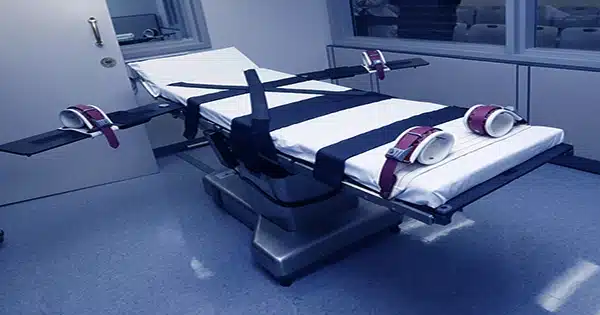The first execution via nitrogen gas asphyxiation will go ahead, according to an AUS district judge. The result means that Alabama convict Kenneth Eugene Smith will be executed using the new procedure on January 25, despite his lawyers having filed an appeal against the decision.
Smith’s legal team claims that he is being treated as a guinea pig for an experimental treatment and that the proposed execution constitutes cruel and unusual punishment, making it unlawful. The state of Alabama proposes placing a respirator over the prisoner’s nose and mouth to replace all breathing air with nitrogen gas, eventually resulting in suffocation.
The state attorney general’s office stated at a court hearing in December that the approach would “cause unconsciousness within seconds, and cause death within minutes,” according to the Associated Press. Smith’s lawyers responded by stating that the American Veterinary Medical Association warns against using nitrogen hypoxia as a form of euthanasia for all mammals save pigs because the procedure is too “distressing.” However, during a hearing earlier this week, federal judge R. Austin Huffaker concluded that Smith could be killed using the new procedure.

In his report, Huffaker acknowledged that his decision means that “Smith is not guaranteed a painless death,” but ultimately found that the inmate “has not shown, and the court cannot conclude, that the Protocol inflicts both cruel and unusual punishment, rendering it constitutionally infirm under the prevailing legal framework.”
Smith was condemned to death for the 1988 murder of Elizabeth Dorlene Sennett, for which he received $1,000 from the victim’s husband. In November 2022, he was the target of a failed execution attempt, in which prison workers spent 100 minutes attempting to administer a fatal injection but were unable to find a vein by the midnight deadline for the execution.
Failed executions have grown more regular in the United States after 2010, when the manufacturers of sodium thiopental stopped supplying the substance for use in lethal injections. This has prompted many states to look for new means to execute criminals, with some opting for the sedative midazolam.
However, the use of midazolam has been highly controversial, with some prisoners appearing to have convulsions several minutes after being injected. In search of a more effective execution procedure, Oklahoma became the first to allow nitrogen asphyxiation in 2015.
Mississippi and Alabama quickly followed suit, however, no prisoners have yet been executed using this procedure. Unless Smith wins his appeal, he will be the first.














